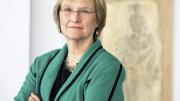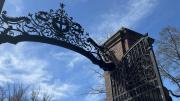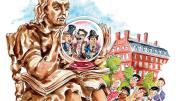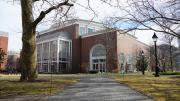I write to you from snowy Harvard, having just returned from a week in London, Cambridge, Zurich, and Davos—a trip that combined delivering the Rede Lecture at Cambridge University and meeting with alumni from five continents at the annual World Economic Forum. As this reaches you, I will be about to depart for China, where I will be visiting with some of the more than 1,700 alumni living and working there, meeting with University leaders from the country’s burgeoning higher education sector, and delivering an address on the role that research universities can play in combating climate change.
In preparation for my international trips, I inevitably learn something new about Harvard’s extraordinary reach. Across the University, global connections and collaborations are developed, sustained, and enhanced based on interest and opportunity. A wide range of entrepreneurial efforts are supported by thoughtful infrastructure, and the result is a global strategy that is especially nimble. Harvard is in the world and of the world in more ways than one might envision—or hope to include on a single page.
We start, of course, with our scholars. One in three faculty members comes from an international background or has international education experience. The College welcomed freshmen from 69 countries this fall, and one in five students enrolled at the University is international. Add to those numbers the thousands of individuals who study at Harvard for a week or a semester or a year, immersing themselves in non-degree programs offered across our Schools. The T.H. Chan School of Public Health and the Kennedy School, for example, co-host forums that bring health and finance ministers from around the world to our campus, creating a space for them to interact in person and share their knowledge with our community.
Bringing Harvard to the world is happening in more ways than ever before. Last year, research projects with international activity received $165 million in support from the University. The Center for African Studies has become one of higher education’s foremost voices on the study of Africa and was recently named a National Resource Center by the U.S. Department of Education. It is currently preparing to establish an office in Cape Town, which will bring the total number of Harvard offices outside of the United States to sixteen.
Our physical presence is exceeded by our digital reach. Nearly 2 million learners have registered for courses through HarvardX, almost two thirds of them from outside of the United States, with India, China, and Brazil among the countries most represented on the online learning platform. A high school student taking CS50, an introduction to computer science, became so enamored with the course that he offered to translate it into Portuguese. He is now a sophomore in the College and recently served as CS50’s head teaching fellow, blending his digital and actual Harvard experiences in ways that are becoming increasingly common.
Harvard is one of the few places in the world capable of bringing together talented individuals to develop solutions to some of the greatest challenges facing humanity. Consider climate change. Any concern for the future of the planet must be based, in part, on an understanding of the outsized role the built environment plays in consuming—and wasting—energy. The Harvard Center for Green Buildings and Cities, launched just last year, convenes scholars and practitioners of design; of business, engineering, law, public health, and public policy; of the arts and the sciences to lead change in how people think about the buildings they inhabit and the buildings they construct—knowledge that can be used in Cambridge or Mexico City or Mumbai.
Bringing more intention to international efforts across the University will help to ensure that Harvard remains inherently global. Indeed, we are approaching an era when the phrase “global Harvard” will seem as redundant—and unnecessary—as “networked campus” seems to us today. Our students and faculty will think, work, and live without boundaries, situating their ideas and their aspirations in the broadest context possible, and the cosmopolitan spirit present from Harvard’s earliest days will enliven all that we imagine and do.
Sincerely,
Drew Faust









